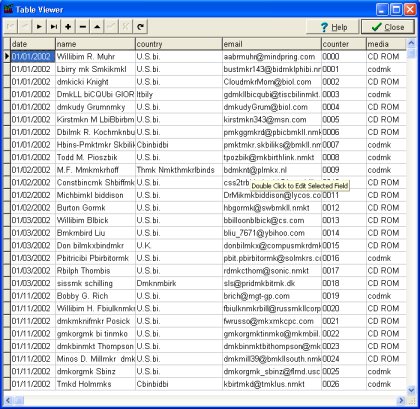Top Tips On Selecting A Hematologist Email list
Wiki Article
What Are The Factors I Need To Think About Before Buying A Pathologist E-Mail List?
Consider these factors when purchasing an email list of a pathologist to ensure the data is accurate, in compliance with the law and suitable for your marketing or outreach objectives. Here are the most crucial elements to be considered: 1. Quality and accuracy of the data
Data source: Make sure that the email list provider gathers their data using reputable sources, like professional directories, health databases, or opt-in contacts that have been verified. This will ensure that the messages are current and up to date.
Verification Process: Confirm that the list of email addresses is up-to-date. Providers need to have a system in place for validating email addresses and eliminating non-active or invalid ones. Good quality lists have a lower bounce rate and better deliverability.
Segmentation and Customization: Look for lists with options for segmentation, such as by geographic area and subspecialties (e.g. Forensic pathology, forensic pathology, clinical pathology) or years of expertise, or hospital affiliations. Customization lets you focus your marketing, increasing the likelihood of reaching the correct audience.
2. Legal Regulations
Data Privacy Regulations Ensure that your email list is in compliance with all relevant data privacy laws including the General Data Protection Regulations in Europe or the California Consumer Privacy Acts in the U.S. The data of a pathologist must be collected in a legal way, but keeping in mind privacy of the individual.
CAN-SPAM Act: If your are located in the U.S. or targeting U.S. pathologists, make sure the email list complies with the CAN-SPAM Act, which regulates commercial email. Non-compliance may result in heavy penalties.
Check to ensure that the emails on the list are that have valid opt-in permission. This will ensure that pathologists have opted-in to receiving promotional content. It also helps reduce the risk of complaints about spam and maintain your company's excellent reputation.
3. Provider Reputation
Credibility of the provider: Pick a reliable service that has provided precise and complete mailing lists. To determine the quality of service review the reviews, request testimonials, and connect with other health marketers.
Transparency: The company should be transparent about their data-gathering methods as well as the frequency at which the information is updated. Beware of companies that are ambiguous regarding the origins of their email list.
Customer Support - Search for companies that provide excellent customer services in case of technical issues or when you need assistance with your list.
4. Cost and Return On Investment (ROI).
Pricing Models There are a variety of pricing models available, including pay-per - contact and flat-fees for a list, or a subscription. Examine whether the price is in line with the budget for marketing and your possible return on investment (ROI).
Refund Policy. Certain providers offer the option of a refund or a guarantee in case you receive a lot of unreliable emails or they do not match your expectations. Review the company's policy on refunds or replacements.
Value for Money - Check the price of a list with its quality, the degree of segmentation and other offerings (e.g. Campaign management, CRM Integration). The most affordable list might not always be the best in the event that its quality of service is low.
5. Ownership of Data, Usage of Data Access, and Ownership
Be clear about your usage and licensing rights. Are you looking to purchase the list once, or do want to use it on a regular basis? Some providers only offer an individual-use license, while others allow unlimited usage which is more advantageous for ongoing outreach.
Exclusive vs. shared lists: Find out whether you're the only customer on the list, or if it's distributed to other buyers. Exclusive lists may lead to a more positive response because the contacts won't receive a barrage of emails from different sources.
6. Data Integration and Format
Compatibility with CRM/Email Marketing Tools: Ensure that the email list is easily integrated into your CRM tools or other email marketing software. The data should be provided in a format that is widely used, such as CSV or Excel. The information can be imported easily.
Data Segmentation – Evaluate the effectiveness of filtering and separating the list, once it has been integrated. Effective segmentation allows you to create personalized email campaigns that usually are more open and have higher reply rates.
7. Ethical Besorgnization
Relevance: Pathologists are highly-specialized fields. Make sure your message products or services are appropriate to their needs. Sending irrelevant messages could damage your brand and cause spam complaints.
Avoiding Spam: Over-emailing or sending unwanted content can result in spam complaints. Plan carefully and use the checklist in a responsible manner when making your plans to prevent harming the reputation of the sender.
Conclusion
If it is done right, buying the pathologist mailing lists could prove to be a powerful tool for marketing. To maximize the potential of your marketing efforts, give priority to data quality as well as compliance with legal requirements, and the reputation of the service provider. Be sure the list is tailored to your particular requirements and that you adhere to rules regarding data privacy and ethical practices in marketing. If you think about these aspects, then you can have a successful email campaign aimed at pathologists. See the top pathologist email list for site guide.

What Should I Consider Before Buying An Oncologist Email List?
When purchasing an oncologist email list, it's essential to consider factors that ensure that the list is of high-quality legal and tailored to your particular objectives in marketing. Here are the most important considerations to consider: 1. Data Quality and Accuracy
Source of Data - Make sure the email list you are using comes from a trusted source, like medical directories, professional association, or database in healthcare. Beware of lists that come untrusted or from unidentified sources since they could contain outdated information.
Verification Method: The list provider must have a solid verification procedure in place to ensure that the email addresses are correct, valid, and active. The list provider should regularly clean up and update it to remove incorrect, duplicate or inactive contact. This will ensure higher deliverability rates.
Segmentation: A good oncologist list of emails should provide segments to choose from. Being able to filter the list by subspecialties (e.g., pediatric oncology, surgical oncology, hematology-oncology), geographic location, years of experience, or institution allows for more targeted outreach, increasing the likelihood of engagement.
2. Legal Regulations
Data Privacy Regulations – Ensure that your email list is compliant completely with all applicable laws. The General Data Protection Regulations, or GDPR, in Europe; the California Consumer Privacy Act, or CCPA, in the U.S.A. Email addresses must be gathered and processed legally, while respecting the right to consent and privacy.
Compliance with the CANSPAM Act: If you are conducting a campaign in the United States, be sure that your list conforms to the CANSPAM act which governs all commercial emails. This means providing the option to opt out of your emails, using precise subject lines, and not informing recipients with deceptive information. Failure to comply could result in penalties and may damage your reputation.
Opt In Consent: Verify the email address list was obtained through opt-in consent. Oncologists are required to have consented for the sending of marketing messages. This will help ensure compliance with privacy legislation and reduce the risk of spam complaints.
3. Provider Reputation
Reputable List Provider: It is essential to purchase your information from a list provider with a proven track record in the business. To verify their legitimacy, examine their past work, read reviews, testimonials or case studies. Established companies are more likely to supply accurate and compliant lists.
Transparency. Providers must be open about the source of their data, where it comes from, how often they update the data, and how they verify. Transparency can be a red flag that may indicate poor data quality.
Customer Support: Select a service provider who offers prompt customer support should you have questions about the integration, segmentation, or compliance.
4. Cost and Return on Investment
Understand the structure of pricing, for instance whether it is based upon the number of contact, a one-time fee, or subscription. Take into account how the pricing model aligns with your budget for marketing and the anticipated ROI.
Refund or Replacement Policy: A reliable supplier will provide a reimbursement or replacement policy for incorrect or obsolete email addresses that are not valid or outdated. Be sure to read the terms before purchasing to ensure that you are protected.
Do not focus on the cost alone. A list with a lower price may be appealing however if it results in a poor deliverability or a low engagement, it can eventually harm your campaign. You should prioritize quality and ensure that the list contains relevant and correct information.
5. Data Use and Ownership
If you're not sure, ask if it is an all-purpose list or if ownership allows for continuous use. Lists for single-use are likely to be more affordable, but should you be planning several campaigns, having the list could provide more flexibility and longer-term value.
Exclusive vs. shared lists. Find out whether the lists are only available to you or if they're available to multiple buyers. Exclusive lists are more valuable because they reduce audience boredom which leads to increased engagement.
6. Data Integration and Format
Compatibility with CRM: Make sure that the list can be easily imported into your customer relationship management (CRM) system or email marketing software. The list must be provided in CSV file or Excel spreadsheet for easy integration. CSV file or Excel spreadsheet to allow for seamless integration.
Simple Segmentation Your CRM should make it easy to segment and manage your list. If you are able to filter quickly using criteria such as the subspecialty of cancer or geographic area, it will help your campaigns to be more efficient.
7. Ethical Aspects
Relevance in messaging Oncologists are highly skilled professionals who have very demanding schedules. Your message must be relevant to their job or to their interests. Examples include medical equipment, ongoing educational opportunities, and pharmaceutical advances. Irrelevant emails may result in a negative image of the brand and lower engagement.
Avoid spam: Do not send unwelcome emails or excessive amounts of emails. This could result in complaints about spam. It is important to send emails on a regular basis to engage your audience without burdening them.
Also, you can read our conclusion.
When purchasing an oncologist's email list, you should consider accuracy of the data as well as legal compliance and provider reputation. The list needs to be properly segmented, validated and tailored to your intended market. You can create a legal efficient outreach strategy by analyzing these elements. This will boost engagement and deliver strong outcomes. View the pro oncologist email list for more info.
